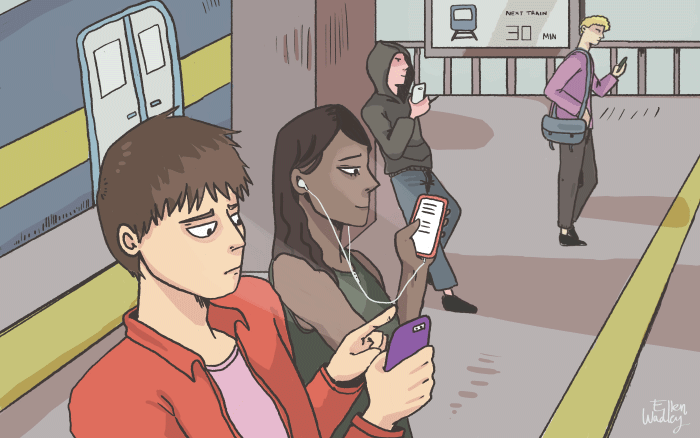The Conversation, 17 July 2023
Why am I online? Research shows it’s often about managing emotions
Article by Wally Smith and Greg Wadley

This project aims to develop a theoretical framework and novel technologies to investigate how, where, when and why people engage in digital emotion regulation. Existing research shows that individuals often use digital technologies to shape their emotions in response to situations; yet social norms often cast such technology use as disrespectful or distracting. The discrepancy between the practice and perception of digital emotion regulation is due to the lack of a systematic understanding of these practices. This project aims to develop a novel framework for better understanding digital emotion regulation, ways to study it in everyday settings, and evidence-based recommendations for managing it in ways that benefit individuals and society. The evidence provided by this project will inform the societal debate about technology overuse and its impact on work, education and interpersonal relationships. The created knowledge will inform policy-makers, designers, and end-users about appropriate use of technology in everyday settings.
Funding source: ARC DP190102627. Project time frame: 2019–2022

Shi, Y., Koval, P., Kostakos, V., Goncalves, J., & Wadley, G. (2022). "Instant Happiness": Smartphones as Tools for Everyday Emotion Regulation. International Journal of Human-Computer Studies https://doi.org/10.1016/j.ijhcs.2022.102958.
Tag, B., Sarsenbayeva, Z., Cox, A. L., Wadley, G., Goncalves, J., & Kostakos, V. (2022). Emotion Trajectories in Smartphone Use: Towards recognizing emotion regulation in-the-wild. International Journal of Human-Computer Studies. https://doi.org/10.1016/j.ijhcs.2022.102872.
Tag, B. van Berkel, N., Vargo, A., Sarsenbayeva, Z., Colasante, T., Wadley, G., Webber, S., Smith, W., Koval, P., Hollenstein, T., Goncalves, J., & Kostakos, V. (2022) Impact of the Global Pandemic upon Young People's Use of Technology for Emotion Regulation. Computers in Human Behavior Reports
Wadley, G., Kostakos, V., Koval, P., Smith, W., Webber, S., Cox, A., Gross, J., Höök, K., Mandryk, R. & Slovák, P. (2022) The Future of Emotion in Human-Computer Interaction . CHI '22 Extended Abstracts
Smith, W., Wadley, G., Webber, S., Tag, B., Kostakos, V., Koval, P., & Gross, J. (2022) Digital Emotion Regulation in Everyday Life. Proceedings of CHI 2022
Hossain, E., Wadley, G., Berthouze, N., & Cox, A. (2022) Motivational and Situational Aspects of Active and Passive Social Media Breaks May Explain the Difference Between Recovery and Procrastination . Proceedings of CHI 2022 Late-Breaking Work
Tag, B., Goncalves, J., Webber, S., Koval, P., & V. Kostakos, (2021). A Retrospective and a Look Forward: Lessons Learned From Researching Emotions In-the-Wild IEEE Pervasive Computing, 1–9.
Tag, B., Webber, S., Wadley, G., Bartlett, V., Goncalves, J., Koval, P., & V. Kostakos, (2021). Making Sense of Emotion-Sensing: Workshop on Quantifying Human Emotions. UbiComp: Ubiquitous Computing Conference '21
Yang, K., Wang, C., Gu, Y., Sarsenbayeva, Z., Tag, B., Dingler, T., & Goncalves, J. (2021). Behavioral and Physiological Signals-Based Deep Multimodal Approach for Mobile Emotion Recognition. IEEE Transactions on Affective Computing, 1–1.
Yang, K., Wang, C., Sarsenbayeva, Z., Tag, B., Dingler, T., Wadley, G., & Goncalves, J. (2020). Benchmarking commercial emotion detection systems using realistic distortions of facial image datasets. The Visual Computer, 1–20.
Sarsenbayeva, Z., Tag, B., Yan, S., Kostakos, V., & Goncalves, J. (2020). Using Video Games to Regulate Emotions. In 32nd Australian Conference on Human-Computer Interaction (pp. 755–759).
Wadley, G., Smith, W., Koval, P., & Gross, J. (2020) Digital Emotion Regulation. Current Directions in Psychological Science
Sarsenbayeva, Z., Marini, G., van Berkel, N., Luo, C., Jiang, W., Yang, K., Wadley, G., Dingler, T., Kostakos, V., Goncalves, J. (2020) Does Smartphone Use Drive our Emotions or vice versa? A Causal Analysis. CHI 2020.
Wadley, G., Krause, A., Liang, J., Wang, Z. and Leong, T. (2019) Use of music streaming platforms for emotion regulation by international students. Proceedings of OzCHI 2019.
Wadley, G. (2016). Mood-enhancing technology. In 28th Australian Conference on Computer-Human Interaction (pp. 326-332).
The Conversation, 17 July 2023
Article by Wally Smith and Greg Wadley
Pursuit, The University of Melbourne, 22 June 2023
Article by Greg Wadley and Pete Koval
The Guardian, 12 August 2023
interview with Wally Smith
Canberra Times, 21 August 2023
interview with Greg Wadley
Current Directions in Psychological Science Podcast, 29 July 2020
Robert Goldstone of the Percepts and Concepts Laboratory at Indiana University and editor of the APS Journal Current Directions in Psychological Science interviews Greg Wadley, senior lecturer in the School of Computing and Information Systems at the University of Melbourne.
APS Observer, Association for Psychological Science, 30 September 2020
Article by Beth Morling
Pursuit, The University of Melbourne, 2 April 2020
Article by Greg Wadley, Zhanna Sarsenbayeva and Jorge Goncalves
The Conversation, 10 July 2017
Article by Greg Wadley
Explainer: What is digital emotion regulation?
A/Prof Wally Smith's presentation of our paper "Digital Emotion Regulation in Everyday Life" at ACM CHI 2022:
Yaoxi Shi's presentation of her thesis on "Smartphones as Emotion Regulation Tools", part of the Master of Information Systems at the University of Melbourne:
Members of our team along with Kristina Höök, Regan Mandryk and Petr Slovák co-organized a workshop on The Future of Emotion in Human-Computer Interaction at ACM CHI 2022.
Details are in our published proposal paper.
Members of our team along with Vanessa Bartlett, Petr Slovák and Tom Hollenstein co-organized a workshop on Making Sense of Emotion Sensing at UbiComp 2021.
